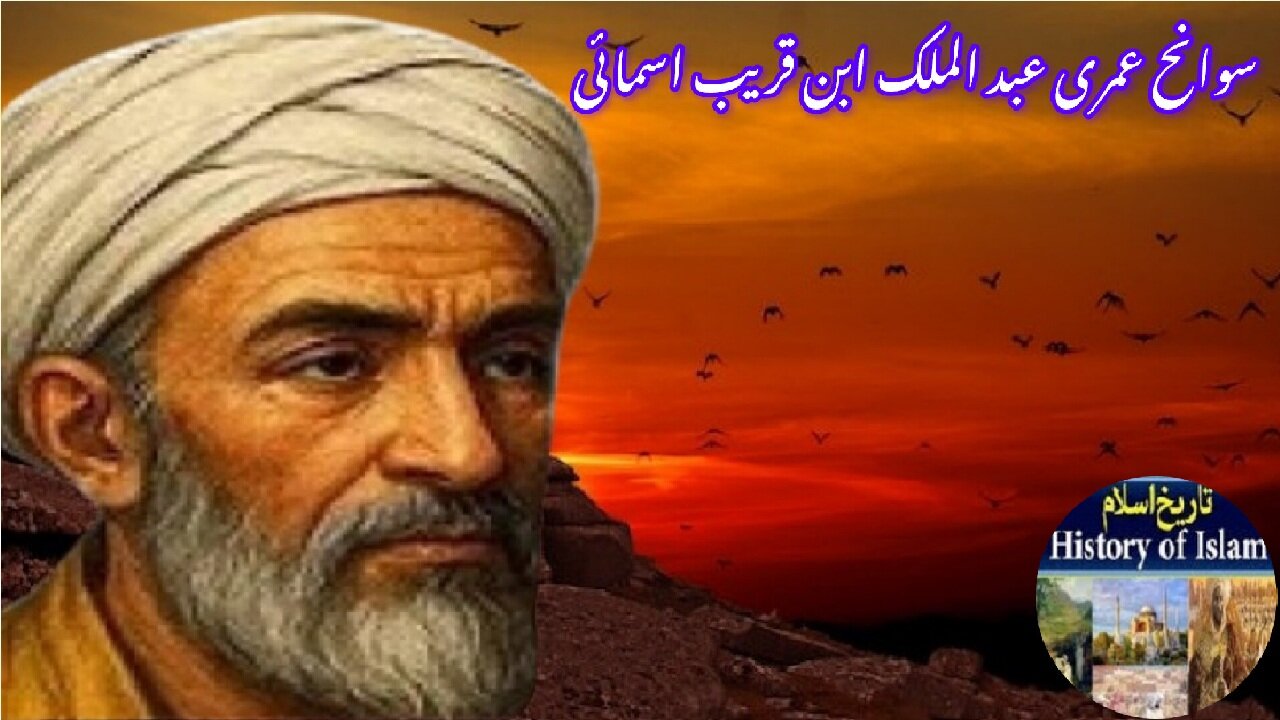Premium Only Content

Biography of Abd al-Malik Ibn Qarib Isma'i سوانح حیات عبد الملک ابن قریب اسمائی
@islamichistory813 #abdalmalikibnqurayb #alasmai #biography
Biography Abd al-Malik ibn Qurayb al-Asmai
Assalamu Alaikum, sisters, brothers, friends and elders, we welcome you to a series of videos on Muslim heritage and Islamic scholars. and today in this video we will describe the biography of Abdul Malik bin Qarib Al-Ismai.
Abd al-Malik ibn Qurayb al-Asmai, famously known as Al-Asmai (c. 740 – 828 CE), was one of the most distinguished scholars of the early Islamic era, celebrated for his mastery in philology, poetry, zoology, genealogy, and natural sciences. He was born around 740 CE in Basra, Iraq, during the flourishing period of Islamic scholarship that marked the rise of the Basra school of grammar and linguistics. His early education was deeply influenced by great teachers such as Al-Khalil ibn Ahmad al-Farahidi, the founder of Arabic prosody and lexicography, and Abu Amr ibn al-Ala, a master of Qur’anic recitation and Arabic grammar. Under their guidance, Al-Asmai developed into one of the most learned philologists of his age.
Al-Asmai was not only a scholar but also a man whose reputation reached the Abbasid Caliphate, where he earned great respect in the court of Caliph Harun al-Rashid (r. 786–809 CE). His vast knowledge of Arabic poetry, language, and Bedouin traditions made him a favorite at the royal court. Harun al-Rashid often consulted him, and his scholarly presence enriched the intellectual atmosphere of Baghdad. His rivalries with other scholars, especially Abu Ubaidah and Sibawayh, reflect the vibrant debates of the Basran school, which shaped the foundations of Arabic grammar and philology.
As a prolific author, Al-Asmai wrote on a wide range of subjects. He is remembered for compiling the famous Asma’iyyat, an anthology of pre-Islamic and early Islamic poetry that preserved the linguistic and cultural heritage of the Arabs. He also composed works on the genealogy of Arab tribes, natural sciences, and zoology. Al-Asmai is often regarded as the pioneer of zoological studies in the Islamic world, producing detailed observations on animal and human anatomy. His writings display a combination of scientific inquiry and literary artistry, making them invaluable to both linguists and historians. He is even credited with compiling an epic on the legendary pre-Islamic warrior-poet Antarah ibn Shaddad, highlighting his interest in Arab heroism and cultural pride.
Al-Asmai’s dedication to preserving the Arabic language was unmatched. He traveled widely among the Bedouin tribes of the Arabian Peninsula, collecting authentic Arabic vocabulary and poetry. This fieldwork ensured that the richness of the Arabic language and its oral traditions were safeguarded at a time when linguistic purity was highly valued. His contributions, alongside those of his contemporaries, laid the foundation for Arabic linguistics and literary criticism for centuries to come.
After a life devoted to scholarship, Al-Asmai passed away in 828 CE in Basra, Iraq, although some sources mention 833 CE. His death marked the end of an era in which Basra had become a beacon of Arabic learning. Al-Asmai was buried in Basra, and over time, his grave became a site of respect for scholars and admirers of Arabic heritage. While not a shrine in the traditional sense of saints and Sufi mystics, his burial place has been regarded with reverence as the resting place of one of Islam’s greatest philologists. Visitors from later generations, particularly scholars of language and literature, often paid homage to his grave as a symbol of intellectual devotion.
The legacy of Al-Asmai remains strong in the history of Islamic scholarship. His works influenced later generations of linguists, poets, and scientists, and his role at the Abbasid court ensured that the pursuit of knowledge remained central to Islamic civilization. His life reflects the spirit of inquiry, preservation, and intellectual excellence that characterized the Golden Age of Islam, and his contributions continue to be celebrated as part of the Muslim scholarly heritage.
With this, we ask for your permission until tomorrow and tomorrow we will narrate biography of Ahmad ibn Abi al-Ashath. Finally, we pray to Allah Almighty to grant us the ability to act on the Quran and Hadith, Amen.
#islamichistory #islamicscholars #islam #history #scholars #hadith #quran #sunnah #islamic #legacy #heritage #wisdom #fiqh #knowledge #tafsir #faith #guidance #islamicworld #muslim #islamiclegacy #imams #islamiccivilization #goldenage #truth #ummah
==================================
-
 7:29
7:29
ISLAMIC HISTORY
2 hours agoYaqut Shihab al-Din ibn Abdullah al-Rumi al-Hamawi یاقوت شہاب الدین ابن عبداللہ الرومی الحماوی
3 -
 LIVE
LIVE
The Quartering
3 hours agoCharlie Kirk Conspiracies Go TOO FAR, Youtube Re-Bans Everyone & Libs Dying From Tylenol
24,808 watching -
 LIVE
LIVE
StoneMountain64
12 minutes agoBattlefield 6 News and Extraction Gaming
493 watching -
 LIVE
LIVE
Russell Brand
2 hours agoThe Truth About UK Corruption – Andrew Bridgen Speaks Out - SF640
9,411 watching -
 LIVE
LIVE
Side Scrollers Podcast
3 hours agoYouTube ADMITS BLATANT Censorship + California Wants to FINE “Hate Speech” + More | Side Scrollers
716 watching -
 1:55:59
1:55:59
The Charlie Kirk Show
2 hours agoDebunking the Lies and Smears about Charlie | ThoughtCrime Team | 9.25.2025
48.7K29 -
 LIVE
LIVE
Sean Unpaved
2 hours agoCup Swings, Homer Kings, & TNF Zzzz's
112 watching -
 8:13
8:13
It’s the Final Round
6 hours ago💰Seahawks vs Cardinals Best Bets🔥Player Prop Picks, Parlays,Predictions FREE Thursday September 25th
8 -
 27:22
27:22
Rethinking the Dollar
1 hour agoSilver at $45: Is War the Spark for $100 Silver? | Thursday News Update
491 -
 1:01:13
1:01:13
Timcast
2 hours agoAnti ICE Shooter Was Kirk Assassin Copycat, FBI Says Attack Was Planned
147K80